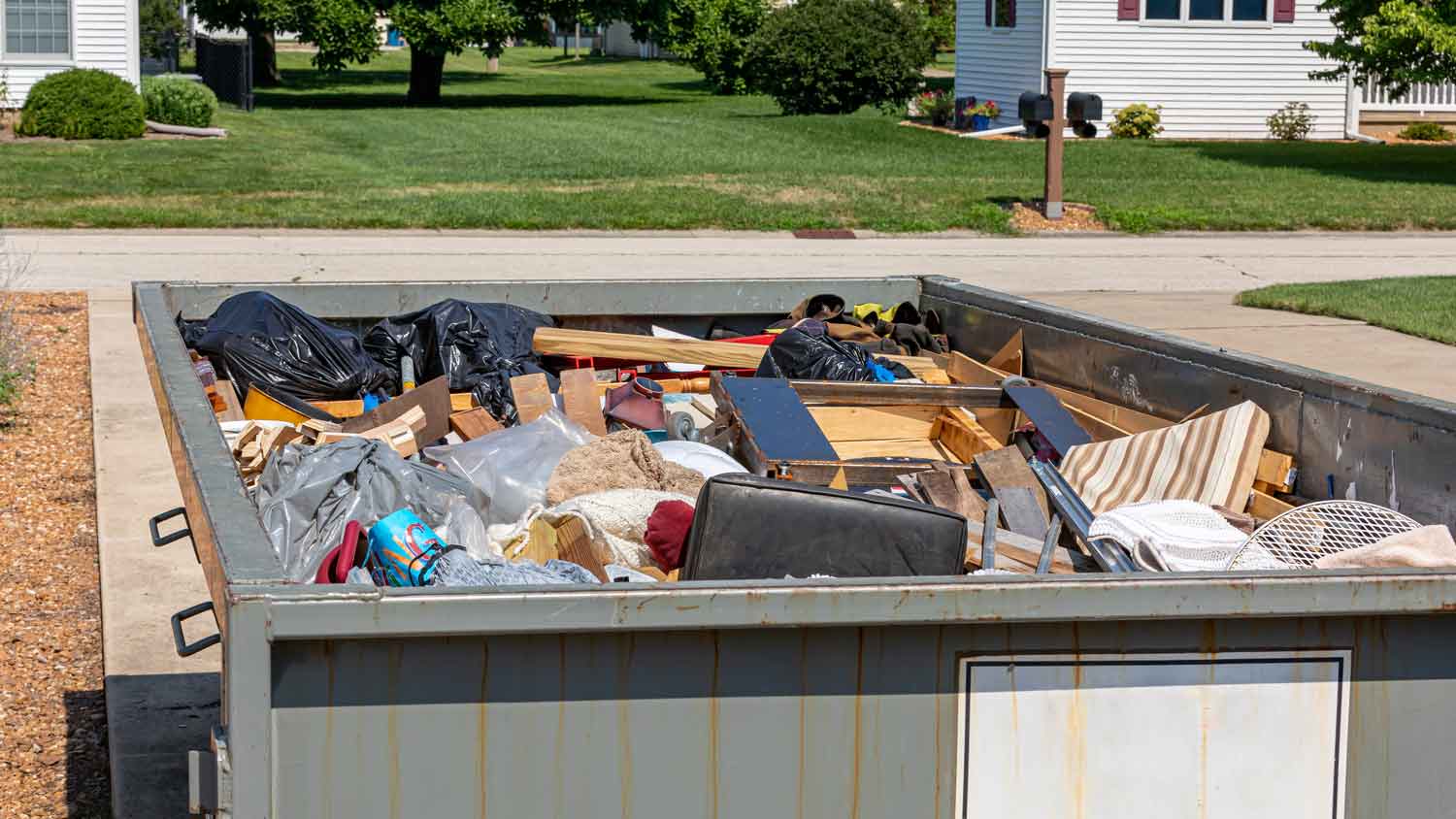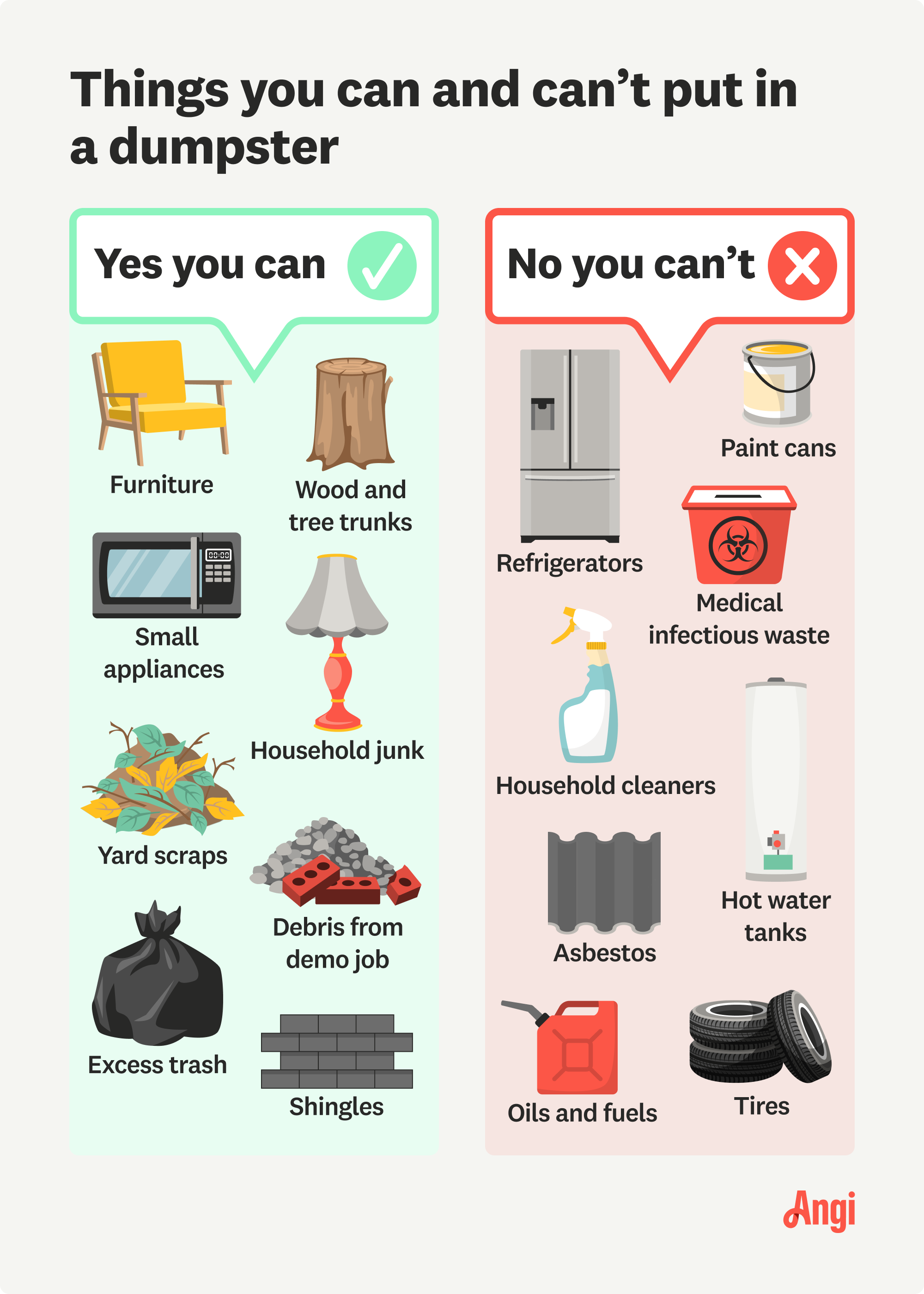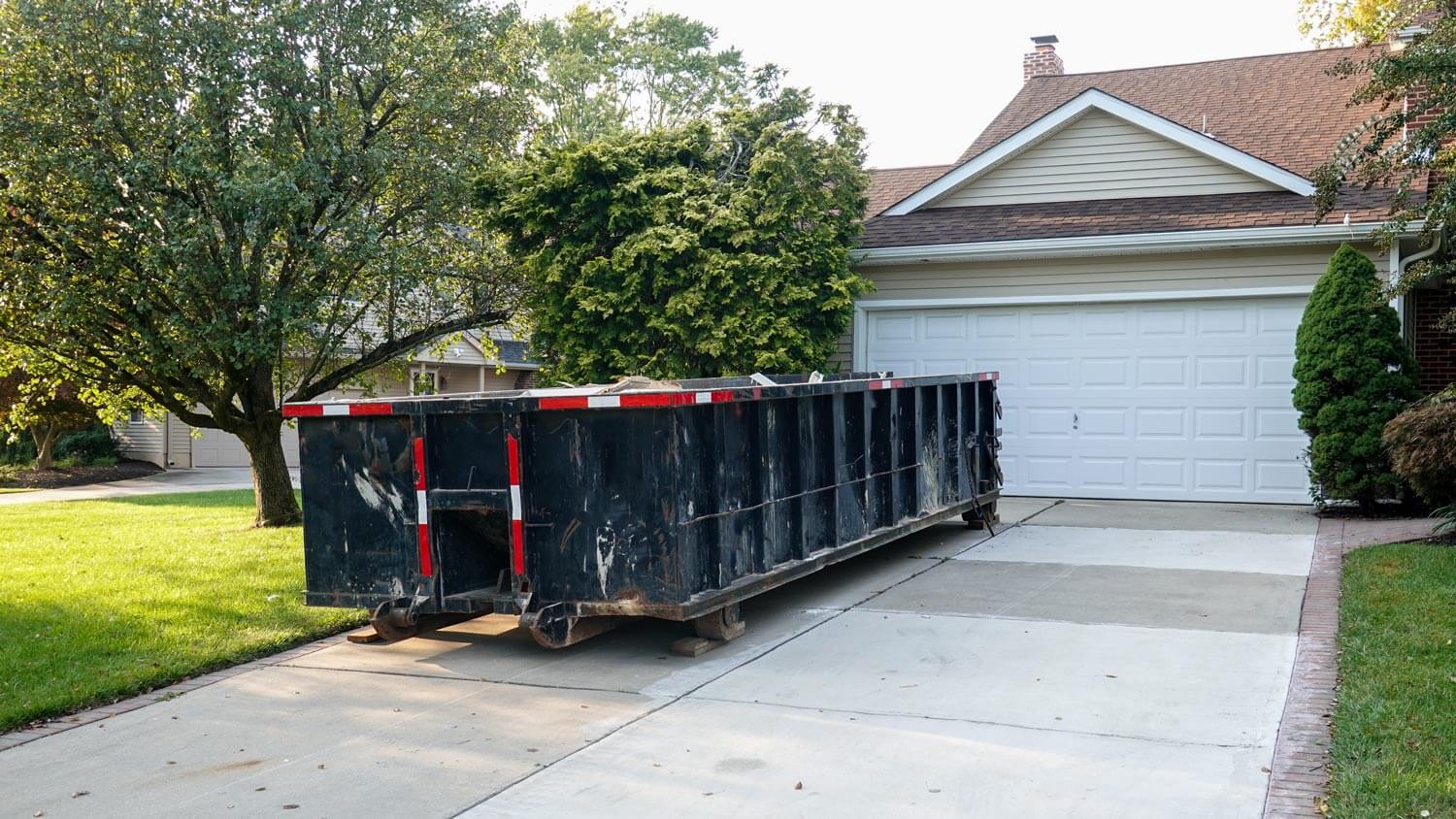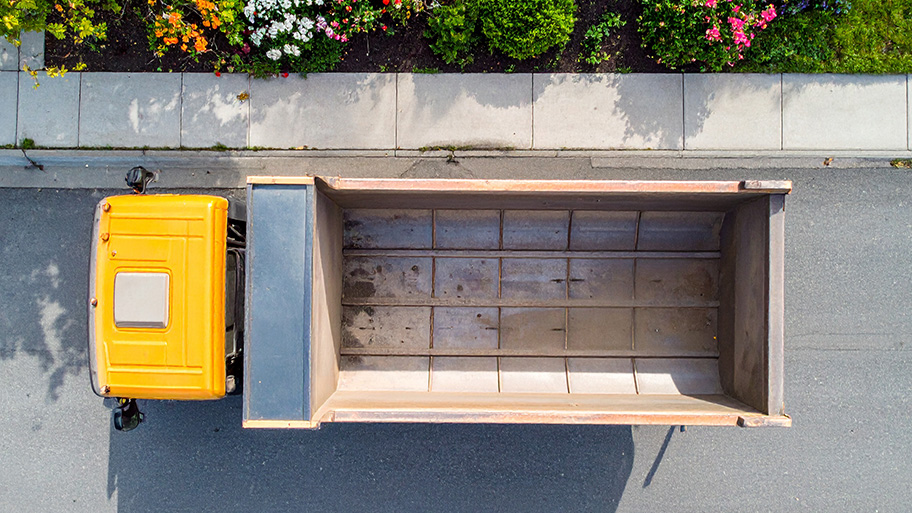
Wondering how much does it cost to rent a dump trailer? Get pricing, cost factors, and tips to help you budget for your next home project.
Take a look at your list before you toss it in


As a rule of thumb, never place hazardous materials in a dumpster.
Every dumpster company and town will specify the list of prohibited materials.
Appliances, e-waste, and liquids should rarely end up in the dumpster.
Renting a dumpster can be a game changer during a large renovation or home cleanout. Knowing what items cannot be placed in a dumpster, however, is just as important as knowing what can go in. Avoid local fines, additional dumpster fees, and even potentially dangerous situations by keeping these no-go items on your list before starting your project.
You can't just throw anything into a dumpster rental. Fluorescent light bulbs, paint, tires, household cleaners, and food waste are just a few commonly prohibited items. Ask dumpster rental companies what you can and can't throw into their dumpsters before renting.

With such a large range of items in and around our home, tossing everything in a dumpster is not always possible. Local environmental and safety regulations set rules for items and chemicals that could pose a hazard to the landfill, groundwater, or the surrounding area.
In general, these items include chemicals, oils, combustibles, food waste, cleaners, and many appliances. In other cases, landscape waste and tires also don't make the cut. All liquids, organic materials such as food, and recyclables may have special instructions as well.
Every company and city sets its own rules about what cannot be placed in a dumpster. Regulations also depend on the type and size of the dumpster you need. After you find the best dumpster company near you, it's critical to check their unique list of prohibited items.

Nearly all batteries require specialized waste disposal for hazardous materials. Not only do they include harmful chemicals that can leach into groundwater, but they can be combustible as well. Batteries that should stay out of dumpsters include:
Alkaline batteries
Rechargeable batteries
Car batteries
Appliances with batteries
Electronics with batteries
You may be tempted to toss your bottle of all-purpose cleaner in the dumpster at the end of your deep clean. However, household and commercial cleaners require special disposal to avoid environmental harm. And while you can put the empty, rinsed-out bottles in some dumpsters, most companies prefer you avoid mixing recyclables. Here are some examples.
Bleach
Window cleaners
All-purpose cleaners
Floor wax
Laundry detergent
Paint cans, old and new, will need a different home than your dumpster. It is also important to check construction debris for lead paint before tossing it in the mix. Dried paint without lead, however, is often acceptable. Painted-related items that cannot go in a dumpster include:
Paint cans with liquid paint
Paint thinner
Lacquers
Lead-based paid debris
Wood stain
Perhaps unsurprisingly at this point, landscape products that contain hazardous chemicals should also stay out of dumpsters. Whether they are in liquid or granular form, avoid these to be safe.
Pesticides
Herbicides
Fungicides
Rodenticides
Fertilizer
Chemicals can sneak into a range of household items, particularly appliances, office equipment, and old car parts. Even tires make the list because they require specialized recycling. Here are liquids and materials with harmful products to look out for.
Inks and Resins (in printers or cartridges)
Fluorescent light bulbs
Adhesives
Epoxies
Oils
Fuels
Tires
Freon (and other refrigerant)
Flammable liquids
Medical waste
Antifreeze
Asbestos
Barrels that contained chemicals
Since nearly all appliances and electronics include one of the items above on our list, they often require specialized disposal. In some cases, the company supplying your new appliance will pick up the old one. In others, it's best to dispose of appliances with help from your municipality.
Your town may also offer e-waste drop-off days, though what is considered e-waste may vary from town to town.
Here are some examples of both categories that shouldn't go in a dumpster.
Refrigerators
Dishwashers
Air conditioners
Washers/Dryers
Garbage disposals
Hot water heaters
Furnaces
Printers
Computers
Phones
Televisions
DVD players
It is best to keep food out of your dumpster for practical reasons, particularly because decomposing food can attract insects and rodents. When applying for a dumpster permit, you may need to verify that you will not put anything in your dumpster that could attract pests and endanger you or your neighbors.
Keep in mind that, in some cases, a dumpster company will not allow you to place yard waste in your dumpster, but this often depends on your contract and local laws on composting. Items in this category include:
Soil
Mulch
Grass
Leaves
Compost
Branches
Food
Beverages
Dirty food containers
Refer to this table if you’re unsure whether something should go into a dumpster.
| Yes | No |
|---|---|
| Furniture | Cleaning supplies |
| Mattresses | Batteries |
| Linens | Organic waste |
| Rugs | Some appliances |
| Flooring | Fuels |
| Tile | Oils |
| Drywall | Adhesives |
So, what do you do with all the stuff that you can’t throw into a dumpster? Well, you have a few options. Call a junk removal company near you to see if they’ll haul away your items—these companies often have special services to dispose of materials that can’t go into their dumpsters.
If you’ve got hazardous materials, you’ll need to find a company that offers specialty hazardous waste removal services. You should always leave hazardous waste disposal to the pros, as it can be dangerous and often requires special disposal methods. If your dumpster rental company doesn’t allow tires, you can often bring them to a local auto shop or tire recycler.
Renting a dumpster for junk removal costs around $380 per week, but prices can vary depending on your location, the size of the container, and how long you need it. That fee usually includes delivery, pickup, disposal fees, and required permits.
Smaller dumpsters for light cleanups will set homeowners back around $250 to $300 on average, while large roll-off dumpsters used for construction debris or major home cleanouts can cost up to $800 or more per week. However, overfilling a dumpster or exceeding the weight limit can incur additional fees, so it's worth confirming those details upfront.
Hiring a junk hauler can be a smart alternative, especially if you don’t have a driveway for a dumpster or if local rules prevent you from placing one on or near your property.
Pricing varies based on what you need to have hauled. Homeowners, on average, can expect to pay anywhere from $60 to $150 for a single bulky item, around $600 for larger loads such as furniture or appliances, and up to $700 for a whole truckload of mixed junk. Remember, your actual out-of-pocket costs might be higher or lower depending on labor rates and disposal fees in your area.
If you’re tackling a home renovation, a major yard cleanup, or a sizable decluttering project, hauling your own junk might sound like the thrifty option. However, it can quickly become a logistical headache. Between multiple trips to the dump, rental fees for a truck, and figuring out where to take items, the time and effort add up fast.
On the flip side, hiring a local dumpster company is often a much smarter move. They will drop off the right-sized container, and then you can fill it at your own pace. They also handle the pickup and disposal for you, allowing you to focus on getting stuff out of your home and not on how or where to haul it.
From average costs to expert advice, get all the answers you need to get your job done.

Wondering how much does it cost to rent a dump trailer? Get pricing, cost factors, and tips to help you budget for your next home project.

Renting a dumpster is more practical than you think. Use this guide to learn how much your rental will cost, the different dumpster types available, and tips to help you save.

A roll-off dumpster can help you dispose of large amounts of waste. Here’s what you need to know.

Dumpster rental and junk removal can help you remove large amounts of junk. Learn the differences and how to choose the right one for your project.

There are several situations where you will need a permit for dumpster rental, especially if it blocks traffic.

Need a dump truck for your project but not sure how big it should be? Use this guide on dump truck sizes and sizing to get the right size for your needs.